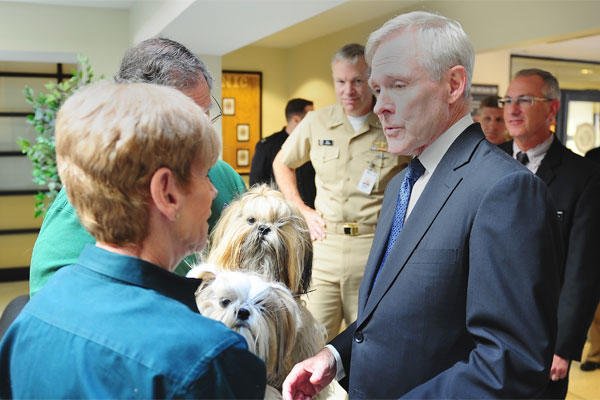WASHINGTON -- In the aftermath of the Washington Navy Yard (WNY) shootings Sept. 16, many organizations have stepped up to give comfort and support to personnel.
The Red Cross, Emergency Family Assistance Center and chaplains have all provided their assistance to counsel and help those who need it. Help is also being provided by a cadre of four-legged emergency workers, as well.
Since Sept. 23, volunteers and their dogs from the Hope Animal-Assisted Crisis Response (HOPE AACR) have been offering WNY personnel the opportunity to meet, pet and play with friendly dogs.
HOPE AACR is an all-volunteer, national nonprofit organization that provides comfort and encouragement through animal-assisted support to individuals affected by crisis and disaster. Teams consist of a handler and their dog, both trained to respond to intense emotional and environmental situations.
"HOPE comfort dogs provide a specialized skill set during recovery that is unique and very simple to explain - they provide an unqualified and appropriate opportunity to smile," said Amy Rideout, a member of HOPE AACR's board of directors. "So much of what we do and say during the recovery process is about significant loss and the serious business of getting the organization back to mission-ready status. The presence of a comfort dog provides an opportunity to unplug from all that and take a deep breath. These simple interactions show the survivors and emergency response personnel that they have support and that someone cares - this enables us to build hope and resilience."
The comfort dogs that perform these services train for predictable situations that the dogs may encounter, such as therapy visits at hospitals and nursing homes, as well as more unpredictable situations, such as evacuation centers and disaster sites where sounds, smells, and actions may provide a more hectic and stressful surrounding.
"The thing that makes us different is that we train above and beyond for certain situations," said Janet Velenovsky, HOPE AACR Eastern U.S. regional director. "Our dogs are required to go through about a year's worth of work at the local level. Then, if they meet certain requirements regarding aptitude and personality, they go through a three-day certification workshop where they receive comprehensive training in animal-assisted crisis response."
The animal-assisted crisis response training is for both the dog and its owner, and includes crisis communication skills, stress management, crisis response protocols, canine behavior and welfare, and field training with emergency responders. In addition, crisis response teams desensitize their dogs to common stimuli they may encounter at an emergency scene. This ensures the dogs will stay calm and attentive during high-stress situations.
"In our certification process, we work with mental health professionals as well as dog training and management professionals," said Ned Polan, HOPE AACR volunteer. "In addition, the people skills that we learn in the certification course are very crisis-specific. We learn what to say and what not to say, and how to interact with people who are going through a crisis situation. Most of the time, it's just listening."
Polan explained that he and his golden retriever, Brinkley, went through an active fire station as part of their certification process as well as an airport.
"At the fire department they made all kinds of noises, they had saws that they ran, the firefighters were wearing all of their gear with all the smokey smells, they were banging hammers, running sirens - all the things you could expect during an emergency," said Polan. "We also went to Bradley Airport in Connecticut and went through the screening process and got on a plane to get used to all of that."
Shortly after the WNY shootings, HOPE AACR volunteers from around the country began wondering how they could help. Rideout immediately contacted support services in Naval District Washington (NDW) to see how and where they could do the most good.
"HOPE was able to support the WNY response because Robert Klebahn, NDW regional Fleet and Family Support Center (FFSC) manager, was able to recognize the value that HOPE Teams can provide and the professionalism with which we serve," said Rideout. "I contacted him as soon as I understood the scale of what had happened at the Navy Yard. He quickly put me in contact with someone on the SPRINT [Special Psychiatric Rapid Intervention Team], and I was on deck in two hours to support their efforts."
Since their arrival, the dogs have been a welcome sight for many around WNY and have left a lasting impact on those they've met.
"I think they're wonderful; I can say personally that dog I pet put a smile on my face," said Lori Knell, program analyst with Commander, Navy Installations Command housing. "It's such a great thing that they do, and such a morale booster. I wish they were here all the time."




























